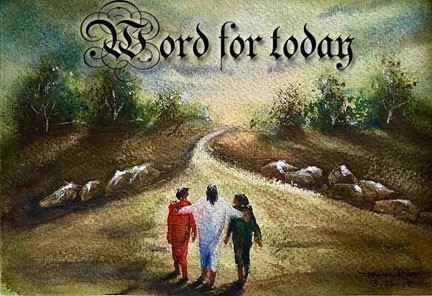Watch
Events
Articles
Market
More
Texas Gathering!
If you live in Texas and would like to be water-immersed or attend a gathering click the link below - don’t delay the Texas gathering is a few days away!
https://triumphintruth.global/thevisionhome



A new Edition of The
Lawful Literal Version
LLV Bible is out now!
…a work in progress with over 70,000 improvements so far!
The whole text of LLV352 He shall see light Edition:
As far as the translator is aware, every name is now spelled with the aim of accurately reflecting the correct, historical pronunciations of these historical names according to modern phonetic English-alphabet transcription, e.g. ‘y’ not ‘j’ for the sound at the start of ‘yellow’, ‘w’ not ‘v’ for the sound at the start of ‘water’. The transcriptions in the LLV are aimed to be better than those of any English translation of Scripture made so far, because they consider not only the pointings of the medieval Hebrew texts but also the older transcriptions in Greek and Latin letters.
Please distribute freely, but only by sharing the link to this doc:
The LLV Bible is free, and now works online! Follow the steps here to get reading the Lawful Literal Version:
https://bit.ly/LLVBible
Please send suggestions for correction/improvement in private messages to Garth Grenache.
A list of all the improvements and the research and thinking behind them can be found at the same, above link.
Would you be pleased to like and follow this work here? https://www.facebook.com/LLVBible



READINGS FOR OMER COUNT – DAY 17
Behold, I am about to fulfill the affirmative precept of the counting of the Omer, as it is written in the Torah:
“And ye shall count unto you from the morrow after the Shabbath, from the day that ye brought the Omer of the wave-offering, seven complete weeks they shall be; until the morrow of the seventh Shabbath shall ye number fifty days.”
Blessed art Thou YHWH, our Elohym, King of the universe, who hast set us apart by Thy commandments and hast given us command concerning the counting of the Omer.
This is the seventeenth day, making two weeks and three days of the Omer.
May the All Merciful restore the service of the Temple to its place. May it be Thy will, YHWH our Elohym and Elohym of our fathers, that the Temple be speedily rebuilt in our days, and grant our portion in Thy Torah. And there we will serve Thee with awe, as in the days of old and as in ancient years.
May Elohym be favorable unto us and bless us. That Thy way may be known upon the earth, Thy salvation among all nations. Let the peoples give thanks unto Thee, Elohym; let all the peoples give thanks unto Thee. Let the nations rejoice and exult: for Thou wilt judge the peoples with equity and lead the nations upon the earth. Let the peoples give thanks unto Thee, Elohym; let all the peoples give thanks unto Thee. The earth hath yielded her increase: Elohym, even our Elohym, shall bless us. Elohym shall bless us; and all the ends of the earth shall fear Him.
READINGS: TEHILLAH 43
Rule me rightly, O Elohim, And plead my cause against a nation without mercy. Oh, deliver me from a man of deceit and unrighteousness!
For You are the Elohim of my strength. Why have You rejected me? Why do I go mourning because of the oppression of the enemy?
Send forth Your light and Your truth! Let them lead me, Let them bring me to Your set-apart mountain And to Your dwelling places.
That I might come to the slaughter-place of Elohim, To Ěl, the joy of my delight, And praise You with the lyre, O Elohim, my Elohim.
Why are you depressed, O my being? And why are you restless within me? Wait for Elohim: for I shall yet thank Him, the deliverance of my face, And my Elohim.
READINGS: TEHILLAH 44
O Elohim, we have heard with our ears, Our fathers have related to us, The work You did in their days, In the days of old.
You drove out the nations with Your hand, But them You planted. You afflicted peoples, and sent them out.
For not by their own sword did they possess the land, Neither did their own arm save them; But it was Your right hand and Your arm, And the light of Your face, Because You delighted in them.
You Yourself are my King, O Elohim; Command deliverances for Ya‛aqoḇ.
Through You we push our enemies; Through Your Name we tread down those who rise up against us.
For I do not trust in my bow, And my sword does not save me.
For You have saved us from our enemies, And have put to shame those who hated us.
In Elohim we shall boast all day long, And praise Your Name forever. Selah.
Yet You have rejected us and put us to shame, And You do not go with our armies.
You make us turn back from the adversary, And those who hate us have plundered us.
You do give us as sheep to be eaten, And You have scattered us among the nations.
You sell Your people for no value, And have set no high price on them.
You make us a reproach to our neighbors, A scorn and a mockery to those round about us.
You make us a proverb among the nations, A shaking of the head among the peoples.
My reproach is always before me, And the shame of my face has covered me, Because of the voice of the slanderer and blasphemer, Because of the enemy and avenger.
All this has come upon us; But we have not forgotten You, Neither have we been false to Your covenant.
Our heart has not turned back, Neither has our step swerved from Your way, Yet You have crushed us in the place of jackals, And covered us with the shadow of death.
If we have forgotten the Name of our Elohim, Or stretched out our hands to a foreign mighty one, Would Elohim not search this out? For He knows the secrets of the heart.
But for Your sake we are killed all day long; Reckoned as sheep for the slaughter.
Awake! Why do You sleep, O YHWH? Arise! Do not reject us forever.
Why do You hide Your face, Ignoring our affliction and our oppression?
For our being is bowed down to the dust; Our body cleaves to the earth.
Arise, be our help, And redeem us for Your mercy’ sake.
READINGS: TEHILLAH 45
My heart is overflowing with an excellent word; I address my works to the King; My tongue is the pen of a speedy writer.
You are more handsome than the sons of men; Favor has been poured upon Your lips; Therefore Elohim has blessed You forever.
Gird Your sword upon Your thigh, O Mighty One, Your excellency and Your splendor.
And ride prosperously in Your splendor, On the matter of truth and humility, righteousness; And let Your right hand lead You to awesome matters.
Your arrows are sharp In the heart of the King’s enemies – Peoples fall under You.
Your throne, O Elohim, is forever and ever; The sceptre of Your kingdom Is a sceptre of straightness.
You have loved righteousness and hated wrongness; Therefore Elohim, Your Elohim, has anointed You With the oil of gladness more than Your companions.
All Your garments are myrrh and aloes, cassia; Out of the palaces of ivory, Stringed instruments have made You glad.
Daughters of kings are among Your precious ones; At Your right hand stands the kingess in gold from Ophir.
Listen, O daughter, and see, And incline your ear, And forget your own people and your father’s house; And let the King delight in your loveliness; Because He is your Master – bow yourself to Him.
And the daughter of Tsor with a gift, The rich among the people seek your favor.
The daughter of the King Is all esteemed within the palace; Her dress is embroidered with gold.
She is brought to the King in embroidered work; Maidens, her companions following her, Are brought to You.
They are brought with gladness and rejoicing; They enter the King’s palace.
Instead of Your fathers are Your sons, Whom You appoint princes in all the earth.
I cause Your Name to be remembered in all generations; Therefore the people praise You forever and ever.
READINGS: TEHILLAH 46
Elohim is our refuge and strength, A help in distress, soon found.
Therefore we do not fear, Though the earth reels And mountains topple into the heart of the seas.
Let its waters rage, foam; Let mountains shake with its swelling. Selah.
A river whose streams Make glad the city of Elohim, The set-apart dwelling of the Most High.
Elohim is in her midst, she does not topple; Elohim does help her when morning turns.
The nations shall rage, Kingdoms shall topple; He shall give forth His voice, The earth melts.
YHWH of hosts is with us; The Elohim of Ya‛aqoḇ is our refuge. Selah.
Come, see the works of YHWH, The ruins He has wrought on the earth, Causing all fighting to cease, Unto the end of the earth. He breaks the bow and shatters the spear; He burns the chariot with fire.
Be still, and know that I am Elohim; I am exalted among nations, I am exalted in the earth!
YHWH of hosts is with us; The Elohim of Ya‛aqoḇ is our refuge. Selah.
READINGS: MISHLE 13:1-12
A wise son accepts his father’s discipline, But a scoffer shall not listen to rebuke.
From the fruit of the mouth a man eats the excellent, But the desire of the treacherous is for violence.
He who watches over his mouth guards his being, But he who opens wide his lips comes to ruin.
The being of the lazy one craves, but has not; While the being of the hard workers are enriched.
A righteous one hates a lying word, But a wrong man is loathsome and comes to shame.
Righteousness watches over him who is perfect in the way, But wrongness overthrows the sinner.
There is one who makes himself rich, Yet has none at all. And one who makes himself poor, Yet has great riches.
The ransom of a man’s life is his riches, But the poor does not hear rebuke.
The light of the righteous rejoices, But the lamp of the wrong is put out.
By pride comes only strife, But wisdom is with those who take advice.
Wealth from vanity diminishes, But he who gathers by hand increases.
Expectancy drawn out makes the heart sick, But a longing come true is a tree of life.
READINGS: AVOTH 3:1-2
All Yisrael have a portion in the world to come; as it is said, all thy people shall be all righteous; they shall inherit the land for ever, the branch of My planting, the work of My hands, that I may be esteemed.
Akav’ya ben Mahalal’el said, reflect upon three things, and thou wilt not come within the power of sin: know whence thou camest, whither thou art going; and before Whom thou wilt in future have to give account and reckoning. Whence thou camest; from a putrid drop; whither thou art going; to a place of dust, worms and maggots; and before Whom thou wilt in future have to give account and reckoning-before the Supreme King of kings, Haqadosh, blessed be He.
Rabbi Chanina S’gan Hakohanym said, pray for the welfare of the government, since but for the fear thereof men would swallow each other alive.




[Exodus 20:18-20] All the people perceived the thunderings, the lightnings, the sound of the trumpet, and the mountain smoking. When the people saw it, they trembled, and stayed at a distance. They said to Moses, “Speak with us yourself, and we will listen; but don’t let God speak with us, lest we die.” Moses said to the people, “Don’t be afraid, for God has come to test you, and that his fear may be before you, that you won’t sin.”
[Deuteronomy 30:15-16] Behold, I have set before you today life and prosperity, and death and evil. For I command you today to love Yahweh your God, to walk in his ways, and to keep his commandments, his statutes, and his ordinances, that you may live and multiply, and that Yahweh your God may bless you in the land where you go in to possess it
[Romans 6:23] For the wages of sin is death, but the free gift of God is eternal life in Christ Jesus our Lord.
[Romans 7:7] What shall we say then? Is the law sin? May it never be! However, I wouldn’t have known sin, except through the law. For I wouldn’t have known coveting, unless the law had said, “You shall not covet.”
[Romans 7:12] Therefore the law indeed is holy, and the commandment holy, and righteous, and good.
[1 John 3:4] Everyone who sins also commits lawlessness. Sin is lawlessness.
[Matthew 7:23] Then I will tell them, ‘I never knew you. Depart from me, you workers of lawlessness.’
https://thestraightandnarrow.cfw.me/comics/936
#bible #bibleverse #bibleverseimages #biblestudy #biblestudynotes #church #christian #webcomic #webcomicseries #cartoon



Shalom!
YAH Willing, Triumph In Truth will host one only Shabbat Water-immersion Gathering in Texas on Shabbat (05/10) at 10 AM. Be sure to fill out the Water-Immersion form on our website if you want to attend a gathering. https://triumphintruth.global/thevisionhome




Was the advent of farming due to some judgment rolling through from YHVH? https://thekingdomnetwork.us/2....025/04/30/ancient-fa



The life-force of every creature belongs to God. Misappropriating it is a direct sin against God. The earth is the source of all nephesh (life-force/living flesh). When a creature dies, its nephesh must be returned to the earth. When you slaughter an animal for food, you must drain the blood and let it return to the earth from whence it ultimately came.
Consider this interesting, related idea: When Moses poured the water of the Nile on the ground and God turned it to blood, he was predicting the death of Egypt. It was a picture of returning Egypt's nephesh to the earth.
#achareimot
#leviticus 17



Therefore I have said to the people of Israel, No person among you shall eat blood, neither shall any stranger who sojourns among you eat blood.
#leviticus 17:12 #achareimot
Leviticus 17:10-14 says that none of God's people are allowed to eat blood. Does that mean we can't eat a rare steak?
No, it doesn't. Let me explain...
https://www.americantorah.com/....2022/03/31/does-the-



050525
Day 16 of counting the omer. The meaning of the number 16, in the Bible, represents love and loving.10 + 6 Ten is the number for the hand of YEHOVAH, 6 Is the number of man.
WORD FOR TODAY “do you want to live”: Lev 18:5 'So you shall keep My statutes and My judgments, by which a man may live if he does them; I am YEHOVAH.
WISDOM FOR TODAY: Pro 16:2 All the ways of a man are clean in his own sight, But the LORD weighs the motives.
www.BGMCTV.org



